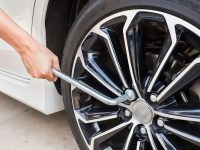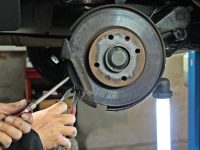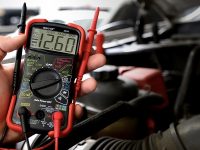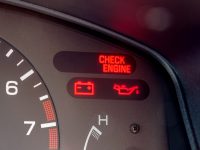Top Reasons Your Check Engine Light Might Be On

When the check engine light turns on, it can create an instant moment of worry. Even if your car seems to be running fine, that small glowing light is your vehicle’s way of telling you something needs attention. If you ignore it, it could get worse, need more expensive fixes, or even break down at the worst time. Knowing the most common reasons for this warning can help you act quickly and avoid worry that isn’t necessary.
Loose or Faulty Gas Cap
One easy thing that can cause the check engine light to come on is a loose or broken gas cap. The gas cap keeps the pressure in your fuel system steady. If it is not tightened correctly or if it has cracks, vapors can escape and trigger the sensor. This does not usually affect your driving, but it can lower your fuel efficiency. Tightening or replacing the cap is an easy fix, and it is always worth checking before assuming something serious is wrong.
Oxygen Sensor Issues
The oxygen sensor checks your exhaust system to see how much air is present. If this sensor is broken, your engine might not get the right mix of fuel and air. Over time, this leads to poor fuel economy, increased emissions, and potential catalytic converter damage. A professional diagnostic test can confirm whether this sensor needs cleaning or replacement. It is a common issue, especially in older vehicles.
Faulty Spark Plugs or Ignition Coils
The mixture of air and fuel in your engine is set on fire by spark plugs and ignition coils. If they start to fail, your engine might misfire, idle roughly, or pause when you try to speed up. This is annoying, and if you don’t fix it, it could hurt your engine. Changing the spark plugs is an important part of regular car maintenance. If you do it on time, your car will run better and more smoothly.
Mass Airflow Sensor Problems
The mass airflow sensor checks how much air is going into your engine so that the right amount of fuel can be sent to it. When this sensor becomes dirty or defective, your vehicle could experience slow acceleration, stalling, or decreased fuel mileage. Because it affects performance directly, addressing mass airflow sensor issues quickly is important. Often, cleaning the sensor is enough, but sometimes a replacement is needed.
Catalytic Converter Trouble
The catalytic converter helps reduce harmful emissions by converting exhaust gases into safer compounds. If this part becomes clogged or fails, your car may lose power and increase fuel consumption. Replacing a catalytic converter can be costly, which makes preventive care essential. Problems with other parts, like oxygen sensors or spark plugs, can also put strain on this component. Taking your vehicle for a proper diagnosis early can help avoid further damage.
Vacuum Leaks
The vacuum system in your engine does many things, one of which is helping to keep the right mix of air and fuel. If the vacuum line leaks, the engine may idle too long or run rough. Rubber pipes can get worn out over time, especially in places where it’s hot. A trained technician and the right inspection tools are generally needed to find the leak.
Why Professional Diagnostics Matter
Although some causes of a check engine light are simple, others require advanced diagnostic equipment to identify accurately. Modern cars have very complicated computer systems, and trying to guess what’s wrong without testing can cause fixes that aren’t needed or problems that aren’t noticed. That’s why it’s important to work with skilled experts. For those in Nevada, All European Auto Repair Las Vegas provides professional diagnostics and detailed repair services tailored to European and luxury vehicles, ensuring the issue is identified and resolved correctly.
Taking the Light Seriously Protects Your Vehicle
A check engine light should never be ignored. Even if your car still runs, the underlying issue can worsen over time. Addressing the problem early helps maintain your vehicle’s performance, prevents costly repairs, and keeps you safe on the road. The key is to stay proactive, pay attention to any unusual sounds or changes, and schedule inspections when needed.
You can handle this warning with confidence and make sure your car keeps running well for years to come if you know the most common reasons for it.







